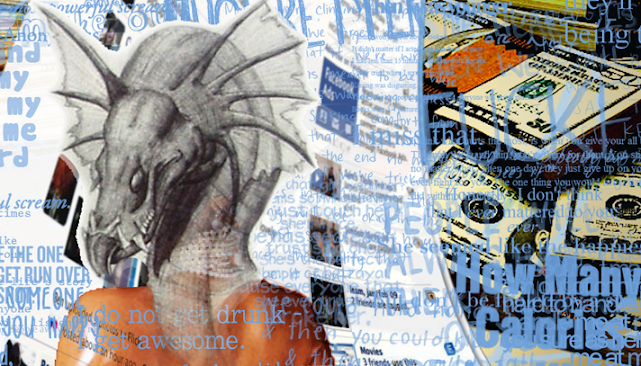By Justin Lewis
Advertising is everywhere. Media that were once largely commercial free – from movies to the internet - now come replete with commercial messages.
Not so long ago, most musicians were reluctant to see their work used to endorse shampoo or sneakers. Today, the music and advertising industries are locked in a lucrative embrace.

We now have commercials in our schools and on our clothes. They clog up – with increasing speed - nearly every form of communication we devise. Our dominant TV genre – in terms of sheer volume - is not comedy, drama or sport, but advertising. The average British viewer is now exposed to 48 TV commercials a day. Recent studies showed that around a third of Australian TV time is now taken up by commercials. In the US the figures is closer to 40%.
Advertising has became our

dominant creative industry – what Stuart Ewen calls ‘the prevailing vernacular of public address’. It sucks up our talent for art, design, creativity and storytelling. It has become such a routine part of everyday life that we rarely stop to think about its significance.
Governments, regulators and media companies tend to regard advertising purely as a form of revenue. They have - under pressure from an industry looking to maximise its income - allowed it to proliferate. There are a few exceptions to this: governments are prepared to limit the promotion of harmful substances such as tobacco, and they police the boundaries of taste and decency. Some governments – like Sweden – have acted to protect young children from the more pernicious influence of TV commercials.

But the prevailing orthodoxy is to treat each advertisement on its individual merits. The larger question – the cumulative impact of this deluge of commercials - is rarely asked. Regulatory bodies assume that most advertising is entirely apolitical, reserving their scrutiny for campaign groups. In an age where economists, social scientists, climate scientists and environmentalists are seriously questioning the value of consumerism, this

idea is no longer tenable.
For all their diversity, advertisements share one basic value system. Advertisements may be individually innocent, collectively they are the propaganda wing of a consumerist ideology. The moral of the thousands of different stories they tell is that the only way to secure pleasure, popularity, security, happiness or fulfilment is through buying more; more consumption - regardless of how much we already have.
There are three problems with this set of values - and they are all profound. First, the promise of advertising is entirely empty. We now have a voluminous body of work showing that past a certain point, there is no connection between the volume of consumer goods a society accumulates and the well-being of its people.
The research shows that a walk in the park, social interaction or volunteering – which cost nothing - will do more for our well-being than any amount of ‘retail therapy’. Advertising, in that sense, pushes us towards maximising our income rather than our free time. It pushes us away from activities that give pleasure and meaning to our lives towards an arena that cannot – what Sut Jhally calls ‘the dead world of things’.
Reviewing the evidence on consumerism and quality of life, Richard Layard argues that legislation banning advertising is a far more plausible policy for increasing quality of life than extending consumer choice. This may be unimaginable in policy terms, but we might begin to ask why we always seem to move in the opposite direction, forever increasing – rather than limiting - the volume of advertising.
The second problem with advertising’s value system is environmental. In a finite world, where the scale of human activity now matches the scale of the planet, our current growth in consumption is unsustainable. The global economy has expanded five-fold in the last fifty years. By the end of the century, if we continue consuming at the current rate, it will be eighty times larger.
Climate scientists insist that if we are to meet the targets required to avoid catastrophic level of global warming, we cannot do it by new technology alone. We must begin to consume less. The nearly half a trillion dollars a year we spend on advertising tells us – with beguiling repetition - to do exactly the opposite. Climate science is not only up against a well-funded PR campaign from vested interests in the energy sector, it has to contend with a hostile cultural environment that continually urges us not to worry and to carry on consuming. Advertising and the culture it promotes thereby threatens the sustainability of life on earth.

The third problem follows from this. If we are to prosper and develop as a species, we must begin to imagine economic models that appreciate the finite, and that do not rely on endless economic growth. We must pursue a way of working that values longevity over built-in obsolescence, on repairing and reusing rather than dumping and replacing. If we want to avoid high unemployment, we need to pass on productivity gains by giving people more free time rather than more money.
Advertising runs counter to all these ideas and thereby stifles our imagination. It keeps us hooked on a cycle of borrow and spend, with fiscal policies dependent on mountains of debt. And it sustains the idea that human progress is measured purely by our ability to acquire as many consumer goods as possible.
Occasionally, advertising can provide us with useful –albeit very partial – information. But in the world of branding, imparting useful information has become increasingly old-fashioned. What we have instead is a vast global industry that elevates one activity above all others, and, in so doing, promotes a very particular set of economic and cultural values.
In an age where these values are coming under increasing challenge, this makes advertising, en mass, intensely political. It is time we recognised it as such.
Justin Lewis is head of the school of Journalism, Media and Cultural Studies at Cardiff University. His books include The Ideological Octopus: An Exploration of Television and its Audience and Constructing Public Opinion.
Support this online project by joining us on facebook! Click below!
{module Facebook FanBox for articles}
{module Related articles}



 But the prevailing orthodoxy is to treat each advertisement on its individual merits. The larger question – the cumulative impact of this deluge of commercials - is rarely asked. Regulatory bodies assume that most advertising is entirely apolitical, reserving their scrutiny for campaign groups. In an age where economists, social scientists, climate scientists and environmentalists are seriously questioning the value of consumerism, this
But the prevailing orthodoxy is to treat each advertisement on its individual merits. The larger question – the cumulative impact of this deluge of commercials - is rarely asked. Regulatory bodies assume that most advertising is entirely apolitical, reserving their scrutiny for campaign groups. In an age where economists, social scientists, climate scientists and environmentalists are seriously questioning the value of consumerism, this 






























Comments
what a stupid comment
RSS feed for comments to this post